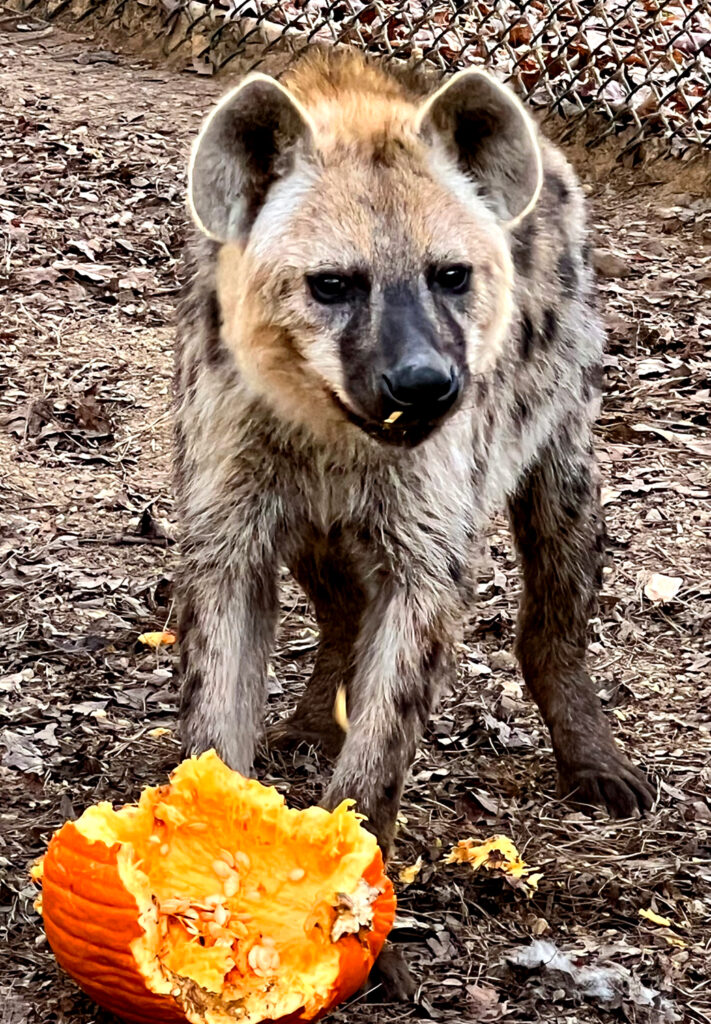By Emmett Burnett

Ten miles west of Gadsden, Alabama is an Appalachian foothill aptly named, “Untamed Mountain.” The road in the picturesque forest spirals upward as birds chirp, squirrels chatter, tigers roar, wolves howl, and bears meander.
Wait. What? You heard me – lions and tigers and bears – oh my! For on this mount is Tigers for Tomorrow, where big cats and other exotics live in safe and spacious enclosures indicative of their native habitats.
“But we are not a zoo,” notes Sue Steffens, founder of the 35-acre preserve celebrating 20 years of operation in Alabama this November. “Quite often, people do not realize when visiting a zoo, you see the most perfect specimens there are. If an animal is not flawless the zoo will not display it.”
Some animals are here because they have lost their jobs or owners. “We have an ocelot who no longer wished to perform at an educational program,” Steffens says. “He’s doing just fine here.”

Other species are perfectly fine, and only guilty of old age. “Sure, some of our animals may look a little rough and maybe walk a bit slower as they get older. We do too!”
Some tenants are former pets such as wolf dogs, brought in by people who thought breeding a domestic dog with a wild wolf was a good idea.
On today’s visit, the grounds’ collection from across America includes eight species of wild cats, including 14 tigers and eight lions. In addition, hyenas, alpacas, foxes, porcupines and much more make the list of over 175 rescued and
rehomed animals.
They live in enclosures – not cages. Each enclosure replicates the occupant’s wild habitat.
“They have a good life here where they will live the rest of their lives,” notes Tigers for Tomorrow’s president of the board and Steffens’ husband, Wilbur James McCauley.
The couple compares their site to an assisted living facility for animals. Steffens notes, “I tell our staff, treat these creatures the way you would treat your grandmother.”

Education is a priority
The couple bring a wealth of knowledge and decades of experience in working with animals all over the country. “But I am not a trainer,” McCauley says. “We do not teach these animals to do tricks.”
Actually, the animals teach visitors. Such education is a Tigers for Tomorrow priority.
Steffens explains: “We want to educate with passion. We believe in igniting a desire for nature and wildlife by engaging and informing our visitors. We hope to instill a deep appreciation and understanding of the natural world, encouraging visitors to become advocates for environmental stewardship.”
She adds, “We strive to foster relationships with animal ambassadors. They are key for creating a connection between humans and nature. Their stories send instinctual messages that resonate with our visitors by creating a powerful and empathetic link with the wild.”
In addition, the founder explains, “We create a ‘wow’ factor. The goal is to make moments of awe and wonder. Our aim is to provide an unforgettable encounter with wildlife that not only educates but also deeply moves our visitors, leaving a lasting impression and a heightened awareness of the natural world.”

Tigers for Tomorrow receives over 30,000 guests yearly. In addition, the preserve receives funding from The Latham Foundation. The grant provides free educational programs for teenagers; more than 1,000 teens have been educated through the grant that includes free admission to
the facility.
Part of the above mentioned “awe and wonder” can be experienced by merely walking down the gravel paths, observing animals, and witnessing staff interactions. Most of the furry friends are on a first name basis with staff members. Each tenant has a story.
Wildlife whispering
Dr. Dolittle has nothing on Steffens and McCauley as they, too, talk to the animals. “Hey buddy! What are you doing?” Steffens says, greeting Zarab, a proud male lion. Remarkably, the deluxe model cat talks back, uttering a guttural response interpreted as “I
am fine.”
As the interview proceeds, Zarab the lion takes a seat and observes, as if agreeing with what is being discussed. He is about 10 feet away (separated by a chain fence).
“Over there is our grizzly bear. He loves his pool, and often shares food with little birds and chipmunks,” Steffens says. The towering brown bear also knows how to work the crowd. She notes, “He knows what visitors like. The more the visitors clap and cheer the more he does.”
The giant bear will take pool toys and playfully splash guests, much to their delight.
Last but not least are the preserve’s namesake, the tigers, over a dozen, the largest weighing about 600 pounds. Most of us never see a tiger from 10 feet away. They are much bigger when seen up close.
To demonstrate, Steffens coaxes a white tiger behind the fence to stand on its hind legs. She hand-feeds the feline of distinction a piece of chicken. The tiger is about the size of a living room sofa. Don’t try this at home.
Tigers for Tomorrow distributes 1,000 pounds of food a day to its animals. “We are fortunate because much of our animal food is donated,” Steffens says. Tyson and other food companies supply meat that may not meet standards for grocery stores but are perfect for lions. In addition, deer farms, hunters, and people in the community often donate food.

Such is the day in an animal preserve perched on an Untamed Mountain. Speaking about working in such a unique job, McCauley explains, “It is more like a lifestyle than a job. Technically, we are never off work. When animals need you, they do not understand weekends, weather, or Christmas Eve. You have to be there.”
Steffens agrees, and addresses her commitment and the rewards of caring for the innocent when no one else would. “This is a wonderful job. I have done more than I ever could have imagined in life.”
Tigers for Tomorrow is open 9 a.m. to 1 p.m. Wednesday and Thursday, and 9 a.m. to 5 p.m. Friday-Sunday. Admission is $20 for adults and $10 for children ages 4 to 11.

The fenced walkabout covers approximately 15 acres. Educational signs are placed throughout the facility. Staff members are happy to answer questions.
The animal refuge is part of the 140 “Untamed Acres,” with RV, camping, and glamping available. Campers enjoy perhaps the only place in Alabama where one can roast s’mores over a fire pit while stargazing and listening to nearby tigers roar and wolves howl.
All day and night, the animals speak from their dwellings. They are fed, cared for and loved, today and tomorrow at Tigers for Tomorrow.
Tigers for Tomorrow is located at 708 County Road 345, Attalla; call 256-524-4150. For more information, visit tigersfortomorrow.org.




